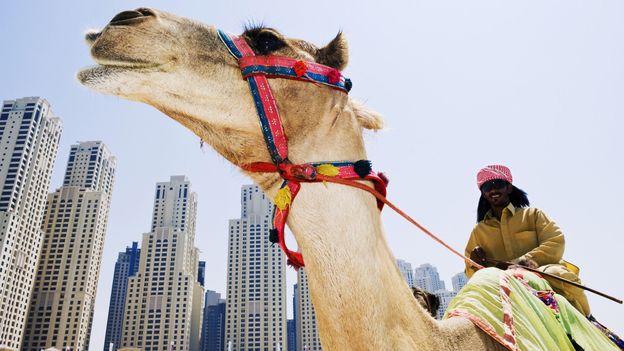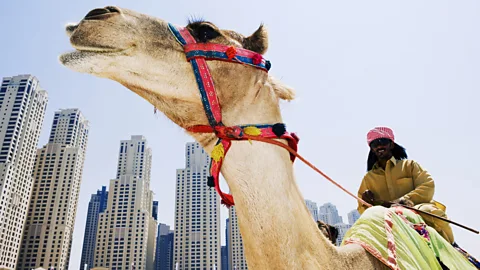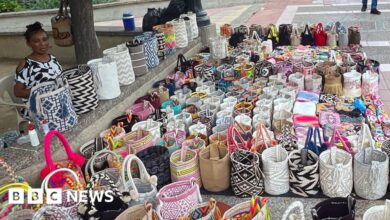Business trip: Dubai


The most populous (and popular) city in the United Arab Emirates seems to have as many cranes as skyscrapers.
After a brief setback in 2009, the Wild West business environment a decade ago has returned to Dubai, the most populous (and popular) city in the United Arab Emirates, where there seems to be as many cranes as there are skyscrapers.
In 2010, Dubai opened 30 brand new hotels (7,700
rooms) for a city total
of 382 (or 51,000 rooms). Despite a wobbly global economy, the emirate
welcomed 8.6 million visitors that year, a 10% increase over the 7.8 million who
came in 2009 according to tourism officials.
Business travellers from around the world
congregate in the Persian Gulf city to attend regional or global conferences,
or to dabble in the many real estate or construction opportunities in the
region. They also come to have fun at sporting events, get pampered at luxury
hotels, soak up the sun and heat, visit superlative architectural sites such as
the Burj Khalifa, currently the tallest building in the world, or
shop in the many traditional souks and large western-style malls.
But Dubai could be reaching the saturation
point. New hotel room growth exceeded visitor growth in 2010, so occupancy
rates remained flat (at 70%) compared to 2009. This has pushed several hotel
companies to put the brakes on development until they see more demand. Nonetheless,
Emirates airline plans to move its Airbus A380 operations into new digs in the
massive 20-gate Concourse 3 at Dubai International Airport later this year. Also,
Al Maktoum International (Dubai’s $34 billion second airport, currently used for cargo only), should welcome its
first scheduled commercial passengers in 2012.
Elegant
At the brand new 160-room Armani Hotel Dubai in the Burj Khalifa tower, everything from the slick, minimalist lobby
décor to the restaurant menus and in-room amenities are designed by Giorgio
himself. If peering out at neighbouring skyscrapers from the world’s tallest
building gets old, you can browse the hotel’s three Armani boutiques selling
clothing, chocolates and flowers, dine at one of its five restaurants, or dance
the night away at the super-chic Armani Prive nightclub. The more traditional Shangri-La Hotel, Dubai is one of the city’s finest, and that is a feat in a
town packed with hotel jewels. The hotel’s business-minded focus, blended with
top-notch care, attracts a regular stream of CEOs, diplomats and celebrities. Its
two towers rise high above the city at the end of busy Sheikh Zayed Road,
offering unimpeded views of the new Burj Khalifa tower (breathtaking as it
peaks through the clouds in early morning fog). Guests of the posh Horizon Club
located on the top floors have access to a private lounge and swimming pool
with an infinity edge that seems to spill over the side of the building.
Internet access is complimentary. Last January, a new 341-room Ritz-Carlton opened nearby. The 14-storey property, sheathed in
French limestone, is connected via walkway to the busy Dubai International
Financial Centre.
Edgy
If the Armani Hotel aesthetic (or price) is too over the top for you, there is the
contemporary, cosmopolitan (and less expensive) 244-room Address Hotel nearby. Both are adjacent to the sprawling Dubai Mall, a great place to wander when temperatures soar
outside. When you tire of glass and steel skyscrapers, consider the relatively
small, avant-garde Desert Palm Hotel, located about 20 minutes away from the glitzy
downtown area and next to the Dubai
Polo Club’s four verdant playing fields, offering a secluded atmosphere and
more wide-open spaces. With only 28 suites and villas from which to choose, the
most popular go quickly. Depending on your agenda, the choices range from the
private pool villas, ideal for those who prefer to sunbathe in privacy, to the
more business-focused ultra-modern suites in the main building with sleek
furnishings and luxe baths, with rain-drenching showers and deep-soaking tubs.
The private riding school, stables and endless greenery make this one of
Dubai’s more unusual and surprising hotels.
Do not do this!
Since Dubai is
a very progressive and modern city full of tourists and expats, it is easy to
forget that you are in a Muslim country. Do not schedule business meetings on
Fridays. The workweek runs Sunday through Thursday. Also, follow the lead of
your host when it comes to shaking hands; this is especially important for
visiting women. Public displays of affection, such as holding hands or hugging
are forbidden, although “air kisses” of greeting are okay between close
friends. “Having drinks” with a client or contact usually means coffee or tea
and alcohol consumption is allowed only in hotels and restaurants. Westerners
should also be observant of holy fasting days during which they should not eat,
drink or smoke in public. If you travel to other nearby emirates such as
Sharjah or Abu Dhabi, expect even stricter rules around such behaviours.
Off the clock
One of Dubai’s
iconic images, Jumeirah’s Burj al Arab hotel, which rises like a large white sail on the
edge of the Persian Gulf, is off limits to the casual or curious non-guest.
However, insiders know that you can get in for a look-see by reserving a table
in advance for one of the hotel’s four sumptuous tea services in various locations throughout the building (prices
range from AED 295 to AED 495).
Visitors can
also escape the road traffic and heat of the city with a traditional dhow boat
tour along Dubai Creek, an inlet running through the centre of town. Dhow boats
are traditionally used to transport goods and can still be seen in use along
the creek every day as workers unload stacks of goods such as electronics and
clothing. Another option: sand-duning
in specially equipped jeeps on desert safari tours. Inquire about dhow boat
or desert safari outings at your hotel.
Source link




